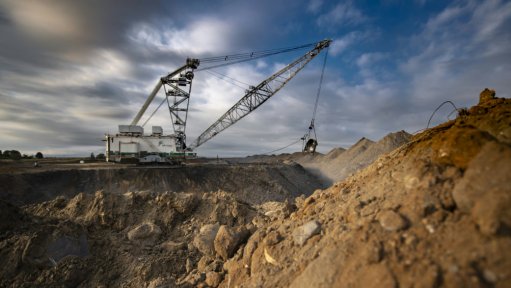
JSE-listed Thungela Resources has continued to deliver strong earnings and cash generation for the period from January 1 to November 30 and expects to achieve another strong set of financial results for the year ending December 31, the company notes in a CFO’s pre-close and trading statement for the full year.
These results have been achieved against the backdrop of various challenges in South Africa, primarily a deterioration in Transnet Freight Rail's (TFR's) performance, a rise in illegal mining activity and increased power interruptions, Thungela reports.
TFR's performance continued to deteriorate in the second half of the year – from an annualised industry rate of 53.3-million tonnes in the first half, down to an expected annualised rate of 49-million tonnes in the second half.
Poor rail performance impacted on Thungela's ability to move coal to port, with a concomitant impact on export sales.
The poor performance was further exacerbated by a 12-day strike by Transnet employees in October, as well as a severe derailment on the coal corridor in early November which took ten days to clear.
While Thungela was able to partially mitigate the impact on its business, the duration of these events, combined with the need for TFR to rebalance the rail system following the conclusion of the strike and the derailment, these incidents resulted in a loss of about 600 000 t of export saleable production for the full year.
Thungela sought to mitigate the impact of the rail challenges to the extent possible by continuing to rail higher-grade products and creating additional stockpile capacity by trucking coal between its operations.
It also trucked coal from its operations to three additional third-party sidings to create further rail loading optionality and derisk train cancellations. Notwithstanding these actions, it was forced to curtail production at some operations in the year.
Demand for energy, including thermal coal, remained firm into the second half of the year given continued supply constraints coupled with the need for energy security globally.
The ongoing conflict in Ukraine resulted in Europe seeking to mitigate the impact of tighter gas stocks through increased imports of coal. Demand in the region is expected to remain firm into 2023 as stocks will have to be replenished following the winter season.
The benchmark coal price has averaged $276.57/t for the year to date, compared with $124.11/t for the previous year. Although prices remain firm, they continue to be volatile.
Export saleable production for the period is expected to be 12.8-million tonnes, lower than the revised guidance range of 13-million to 13.6-million tonnes issued in August, and 15% lower than the previous year’s export saleable production of 15-million tonnes. This is mainly attributable to the reduced and inconsistent TFR rail performance.
Capital expenditure is expected to be R1.9-billion, in line with guidance. This consists of R1.6-billion relating to sustaining capital and R300-million relating to expansionary capital.
Cash flow generation is noted to have been robust on the back of strong realised export coal prices.
Cash flow from operations in December is expected to be neutral owing to the disruption to November sales as a result of the TFR strike and derailment.
Earnings per share (EPS) for the full year are expected to be at least R125. This represents an increase of at least R63.92 (or 105%) compared with the previous year’s EPS of R61.08.
Headline earnings per share are expected to be at least R131, an increase of at least R64.43 (or 97%) compared with the previous year’s R66.57.
Meanwhile, Thungela has taken the strategic decision to focus on the closure of parts of the Khwezela complex in an effort to reduce the impact of illegal mining on the site and to mitigate the risk of future adverse environmental events.
Revised closure cost estimates resulted in a non-cash income statement charge of R1.1-billion in the period. These estimates are higher compared to previous assessments owing to higher diesel costs, an increase in mining inflation assumptions, and the cost of rehabilitating previously rehabilitated mining areas owing to surface disturbances caused by illegal mining activities.
The acquisition of the 27% shareholding in Anglo American Inyosi Coal, the entity which holds the Zibulo operation and the Elders project, underscores the company’s commitment to optimising capital allocation, it notes.
As a result of the transaction, Thungela will benefit from the full economics of the most cash generative assets in its portfolio, providing an uplift in earnings attributable to the equity owners of Thungela.
Recognising that sustainability requires continued and predictable access to insurance, Thungela has implemented a self-insurance structure and will make an initial capital contribution of R1-billion this month.
The board is committed to returning additional cash to shareholders above the targeted minimum payout ratio of 30% of adjusted operating free cash flow. With this in mind, the company expects to declare a final dividend for the year upon the release of its annual results on or about March 27.
Thungela has operated fatality-free for the year to date.